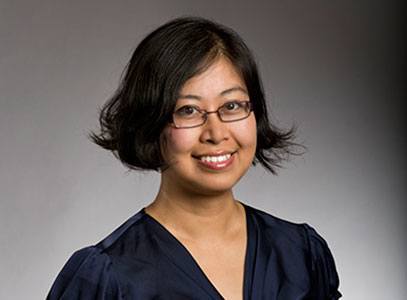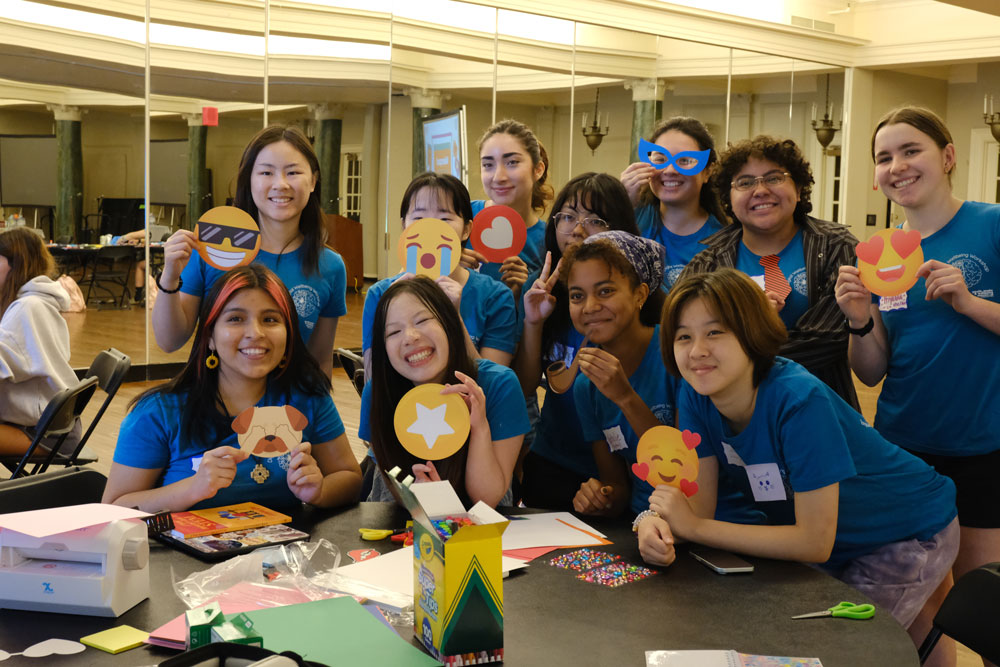
Linda Charmaraman
Senior Research Scientist
Director, Youth, Media & Wellbeing Research Lab
- Ph.D., University of California, Berkeley
- lcharmar@wellesley[dot]edu
- CV
Research interests include adolescent social media use and wellbeing, risky and resilient digital media behaviors within vulnerable peer and family contexts, digital citizenship and how to engage youth in (re)defining and self-monitoring healthy social technology use
Linda Charmaraman, Ph.D., is a senior research scientist at the Wellesley Centers for Women and founder and director of the Youth, Media & Wellbeing Research Lab. Her research and action interests include social technology and adolescent health, digital citizenship, innovative research methods to include overlooked and hidden populations, and how social identities (e.g., gender, race/ethnicity, sexual orientation, political affiliation) affect wellbeing. She is also a consulting expert at The Jed Foundation, a nonprofit that protects emotional health and prevents suicide in teens and young adults.
Charmaraman is a co-investigator in the BOBA Project, a longitudinal study funded by the National Institutes of Health (NIH) that will fill a critical gap in the science of how discrimination affects Asian American adolescent mental health. Her lab’s role is to conduct interviews with Asian American youth on their racial socialization with family and peers, particularly in online contexts. She is also conducting a follow-up to the Women's Leadership in Resident Theaters study, this time to analyze both the racial and gender representation of theater leadership and examine barriers to entry.
Charmaraman recently conducted a multi-year study funded by the National Institutes of Health that followed over a thousand middle school students and their parents during a critical developmental period to determine longer-term health and wellbeing effects of social technologies, including smartphones, social media, and gaming. A key goal of this project was not only to prevent negative health effects of social media use, but also to harness its potential to increase connections with other people and communities through the exchange of social and emotional support and opportunities for civic engagement. Alongside this project, Charmaraman received additional awards from NIH to study the role of pets in the positive development of adolescents.
Charmaraman is co-director of the Adolescent Media Project, a study funded by Boston Children’s Hospital to better understand how social media use connects with mental health and wellbeing for young adolescents, utilizing ecological momentary assessment data that assesses them moment-by-moment, which she plans to cross-analyze with her NIH longitudinal survey data.
Since 2019, Charmaraman has partnered with Wellesley College Assistant Professor of Computer Science Catherine Delcourt to run free workshops for middle school students—now focused on marginalized girls—to help them explore their wellbeing on social media and promote STEM engagement in underserved communities. Guided by a Youth Advisory Board, the workshops encourage participants to (re)define what healthy social media use means as a tween and teen, with the long-term goal of co-designing apps to empower middle school students to self-regulate their own use.
Charmaraman also directs the Media & Identity Study, ongoing since 2011, an international survey of over 5,000 participants in over 20 countries about media use, social identities, digital citizenship, and civic engagement.
In 2023, Charmaraman provided written testimony for a U.S. Senate Judiciary Committee hearing on a bill protecting children online. She also co-authored the 2023 American Psychological Association’s health advisory on social media use in adolescence.
As part of her work to translate research findings to communities, Charmaraman produced a 30-minute documentary video, It’s Our Time: The empathy gap for girls of color, to promote public awareness of the road to educational equity for girls of color. The ultimate goal was to invite public discourse about overcoming barriers to (often overlooked) educational equity for girls of color in order to affect education policy and practice.
Charmaraman’s research has been funded by the National Institutes of Health, Children and Screens: Institute of Digital Media and Child Development, Centers for Disease Control and Prevention, Robert Wood Johnson Foundation, William T. Grant Foundation, Metrowest Women’s Fund, University of Wisconsin, Madison Technology and Adolescent Wellness (TAM), Morningstar Family Foundation, Planned Parenthood League of Massachusetts, Kellogg Foundation, United Way, I Am Strong Foundation, Borghesani Community Foundation, AIDS Action Committee of Massachusetts, and League of Resident Theaters (LORT).
Charmaraman has cultivated research collaborations across institutions, including The Digital Wellness Lab at Boston Children’s Hospital, The Developmental Risk and Cultural Resilience Laboratory at Brigham and Women’s Hospital, the Pets and Well-Being Lab at Tufts University, and the Social Media and Adolescent Health Research Team (SMAHRT) at Seattle Children’s Hospital.
In 2020, Charmaraman was appointed Scientific Advisor and Partner for Forbes Ignite. She is also a former New Connections grantee from the Robert Wood Johnson Foundation, awarded to first-generation scholars to increase diversity in the allied health fields.
Charmaraman’s research has been published by academic journals such as Pediatrics, Journal of Adolescent Health, Computers in Human Behavior, Journal of Adolescent Research, Journal of School Health, Journal of Medical Internet Research, Journal of Youth Development, Information & Learning Sciences, Social Development, Learning, Media, & Technology, Journal of Developmental and Behavioral Pediatrics, Journal of GLBT Family Studies, and Cultural Diversity and Ethnic Minority Psychology.
She has co-authored ten book chapters, has presented at over 100 professional conferences and webinars, and has been participating in action-oriented, community-based events with the goal of translating research for practitioners and policymakers for over a decade. Her work has been featured by media outlets including The New York Times, The Washington Post, NPR, Wired, Good Morning America, ABC News, NBC News, the San Francisco Examiner, Fast Company, Insider, Discover Magazine, The Academic Minute, The Conversation, and others.




